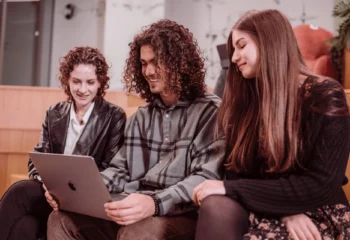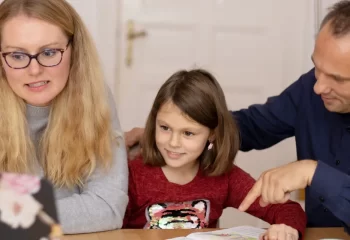This article is part of the Social Interaction in Schools Guide. Learn all about Social Interaction in the Classroom, Student to Student Interaction, and Teacher to Student Interaction.
Social interaction skills are not born with skills. They are developed through interaction and social connections as a baby, young child and adult. Being able to relate to others and have healthy social interaction skills is a responsibility of the parents.
When the child reaches school age, practising social skills in classes is an excellent opportunity to develop some children’s skills more and some less. However, parents should not expect that school is the only one responsible for their children’s social skills development.
Overview of social interaction skills
Why are they important?
Social skills are essential to be a part of a community, create friendships, create and foster relationships, maintain a social life, understand the world and others’ views, and be part of this global community.
While some people may be more introverted and others more extroverted, reaching out to all of them and helping them develop social interaction skills is a great thing. Teachers often find themselves in this situation, and they need to adapt to each child. Only through feeling truly understood can a child open up and grow from all points of view.
As social interactions don’t always go smoothly, people should know how to react in different situations. And this is what social interaction skills can help you with – allow sone to react and respond to others’ feelings in a positive and caring manner.
What are the benefits?
The benefits of social skills are unmeasurable.
They can range from mental and physical benefits to the soul benefits.
Social interaction skills help people
– Create and foster relationships and friendships
– Be surrounded by positiveness in their lives
– Be happy with themselves
– Understand the needs of the other and respond accordingly
– Feel a part of a community
– Communicate effectively with others
The impact of learning social skills
Learning social skills from an early age helps people become aware of their environment and know how to be a part of a community.
Social skills are not to be taken for granted, and giving them the merit they deserve helps us all live a happier and more prosperous world.
Consequences of Good Social Skills
Apart from helping people have a favourable view of life, good social skills allow them to create a friendly environment for themselves and their friends. While the family is something they expect to be a part of for some, it also needs to be built on healthy and good social interaction skills to continue to exist.
The truth is that nothing is for granted, and we have to build all we have. Having good social skills helps you make good strong relationships – family, friends, colleagues, co-workers.
Consequences of Poor Social Skills
Poor social skills kind of leave you alone. Having poor social skills, you have trouble integrating, understanding the needs of the other, making yourself likeable, creating friendships, and having a positive view of life.
All of these have a negative impact on you as a person, your well-being, your physical life, and your self-awareness.
“One of the problems with possessing poor social skills is lack of social awareness, so even if they’re not getting the date, they’re not getting the job, they’re getting in arguments with co-workers or their spouse, they don’t see themselves as a problem,” Segrin said. “They’re walking around with this health risk factor, and they’re not even aware of it.” (Chris Segrin, head of the UA Department of Communication)
Examples of social skills
Expressing emotions
Not all of us like to be open books. However, expressing emotions does not necessarily make us open books. Knowing how to show your feelings to others lets you create strong relationships.
Communication
Communication is essential if we want to achieve something, ask something to learn something. It is what we are taught since babies that if we do not communicate properly, we cannot receive what we need.
Listening
Listening to me needs to be mastered throughout a lifetime, and beginning it from an early age is a must. Listening is about understanding the others, showing respect to others when talking, and taking time to listen to what the others are saying can help you learn a lot.
Following instruction and guidance also needs good listening and social interaction skills.
Group work
Group work needs social interaction skills like communication and listening. Along with the two, knowing to work in a group, taking turns, and allowing and trusting that everyone does their job is a great thing.
Strategies for teaching social interaction skills
Nowadays, teaching social skills can be more accessible from some perspectives but more complex from others. As teachers have access to many online guides on teaching social skills in the classroom and embed them in regular classes, teaching them may seem easy.
But just as much, students have stronger personalities, and sometimes it may prove to be hard to get them to focus and engage in the class thoroughly.
Some strategies teachers can use to improve social interaction skills are:
Sharing space helps students understand how vital it is to share space with others and develop strategies for feeling safer in these situations. Sometimes children and adults may have trouble sharing the same area with others, and as this is a condition they face daily, it is essential to understand its need and try to solve it.
Sharing materials is a problem that children or adults sometimes confront. Sharing can be challenging if you care a lot about something. But people should develop this social interaction skill as there is nothing more important than having the ability to form relationships – no object as in.
Waiting is a luxury for some that want to live the world at the same speed that it turns around. As individuals, we are constructed to see time and feel teh passage of time differently. However, this is what our clocks are for. Just following them makes us will be on the same page as far as time is concerned. More than this, we have to earn patience and understand that sometimes we need to wait – as different situations ask for our ability to wait. Take things slow and with patience.
Taking turns is a social skill that helps people communicate and play.
Trying new things helps you understand and learn more about your world. The more open you are to trying new things, you have increased knowledge about your surroundings. Some people with anxiety may find trying new things hard; this is why developing it as a social skill is vital.
Respecting the ideas of others is hard for children and adults. It is a social skill that needs to be taught in childhood. We are all different and allow others to have a different opinion. Each of us has the right to our thoughts, and if others don’t comply, it does not mean we shouldn’t respect their decisions. It is a skill that takes time to master. The APA points out, “By seeing how other people tackle problems and make positive changes, you can discover a whole range of strategies for facing your own concerns.”
Participating with others is a social skill that allows you to communicate effectively. It does not come easily for some; this is why helping them understand what teh activity means and how they are expected to be a part of the activity is necessary.
Choosing friends is not as easy as it sounds not everyone that shows kindness to you is your friend. They are just socially interacting. If you want friends, choose those who have a genuine interest in your life and help you through bad and good times.
Create Lunch Groups
What is better than lunch groups to engage in social interactions?
From the beginning, food has brought people together, and it still does. Everything is better with a full belly. Teachers can help form lunch groups where each student brings something and shares with others, or where they split the days, and one day one of the students brings the food. Students who share mutual ideas, interests, and friends can also form these lunch groups.
Class stories
Students begin group talk about the book, what they understood, share their inputs, and learn from others through the class stories. They socially interact in a group while showing respect to others’ ideas, taking turns speaking and actively participating in this activity – may it be only listening or also speaking. This is a great strategy to improve reading, listening, and social interaction skills.
Class meeting
Class settings bring all the colleagues together. These are great opportunities for social interaction skills as to whether you share the interest or not, whether you have the same background, whether you are friends outside the classroom or not, you all interact. These interactions are essential in developing the needed skills throughout life. Different situations put them in the position of interacting with strangers. These class meetings help students develop the ability to interact.
Conclusion
Social interaction in the classroom is vital for the healthy development of students. They get the chance to understand what people expect from them, how to react in different situations, participate in groups actively, and choose friends and be a part of a community.
Social skills can never be too developed; we all need to grow them all our lives.
Social Interaction Skills FAQ
What are social skills?
Social skills represent the ability of people to connect with others.
Why are social skills essential?
Social skills are essential to be a part of a community and create strong relationships.
How do students develop social skills?
Students develop social skills through formal and informal class interactions. Many situations can arise in a classroom environment, and each of them teaches students how to interact. Moreover, teachers can also integrate social interaction skills during lessons, teach them, and practice them in the classroom.
What are some basic interaction skills?
The basic social skills are eye contact, body posture, voice quality – tone, speed, clarity, facial expressions, gestures, listening, verbal acknowledgements and head movements. In contrast, more complex social skills include starting conversations, asking for and offering help, giving and receiving feedback, dealing with different situations, negotiation, and conflict resolution.
How can social interaction be taught at home?
Social interaction is taught at home since you are born, and parents do not even know that what children see, they copy. Thus, it happens a lot that if parents are more introverted and do not have many friends, children turn out the same until they seize something is different and ask for help.
“Parents can help with their children’s social skills — and, in turn, their health — not only by limiting screen time but also by making sure children are regularly exposed to situations that require in-person social interaction”, Segrin said. “It could be a summer camp, a sporting program, a church group — something where they can hang out with peers and just talk and do things together,” he said. (Chris Segrin)
However, parents should teach children to listen, respond to their surroundings, react, have a conversation, respect others’ opinions, follow the rules at school and in an educational environment as well as when going to take classes on a sport or passion as well as the importance of friendships.




